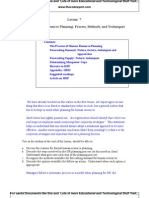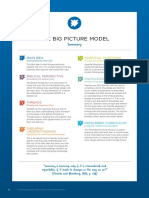100%(3)100% found this document useful (3 votes)
1K viewsEthical Culture in The Organization
Ethical Culture in The Organization
Uploaded by
Syed Mansoor PashaThis ppt explores about the importance of ethical culture in the organization and its sustainability
Copyright:
© All Rights Reserved
Available Formats
Download as PPTX, PDF, TXT or read online from Scribd
Ethical Culture in The Organization
Ethical Culture in The Organization
Uploaded by
Syed Mansoor Pasha100%(3)100% found this document useful (3 votes)
1K views8 pagesThis ppt explores about the importance of ethical culture in the organization and its sustainability
Original Title
Ethical Culture in the Organization
Copyright
© © All Rights Reserved
Available Formats
PPTX, PDF, TXT or read online from Scribd
Share this document
Did you find this document useful?
Is this content inappropriate?
This ppt explores about the importance of ethical culture in the organization and its sustainability
Copyright:
© All Rights Reserved
Available Formats
Download as PPTX, PDF, TXT or read online from Scribd
Download as pptx, pdf, or txt
100%(3)100% found this document useful (3 votes)
1K views8 pagesEthical Culture in The Organization
Ethical Culture in The Organization
Uploaded by
Syed Mansoor PashaThis ppt explores about the importance of ethical culture in the organization and its sustainability
Copyright:
© All Rights Reserved
Available Formats
Download as PPTX, PDF, TXT or read online from Scribd
Download as pptx, pdf, or txt
You are on page 1of 8
Ethical culture
Ethical culture can be defined as a set of experiences, assumptions, and
expectations of managers and employees about how the organization
prevents them from behaving unethically and encourages them to behave
ethically,.
Ethical culture is also part of the ethical context that incorporates multiple
components, including formal and informal systems. Formal systems are the
tangible organizational elements pertaining to ethics that are purposefully
designed and implemented (e.g., ethics programs), whereas informal
systems are the unwritten policies, practices, and values that are relevant to
ethics (e.g., ethical culture or climate).
Importance of Ethical Culture
Steps to Create an Ethical Organizational Culture
1.Top Management Leads Ethics by Example
• One of the most noticeable ways that companies can demonstrate their
commitment to creating an ethical organizational culture is to ensure
that top managers and leaders lead by example. Employees look to the
behavior of top management as an example of the type of behavior that
the company finds acceptable in the workplace. Actions speak louder
than words, so when top executives display ethical behavior, it sends a
positive message to employees. Senior leaders need to be mindful of
the fact that they’re being watched and be sure to practice what they
preach.
2.Communicate Clear Expectations of Good Ethics
• Companies that create and disseminate an official code of ethics send a
clear message of the expectations for their employees. A code of ethics or
code of conduct clearly outlines the organization’s primary values and
ethical rules that they expect everyone to follow. The code should indicate
that it applies to attire, attitudes, and behavior. Cultural norms and
expectations are also inferred and are easily detected by observing the
environment.
• While it’s good to have a written record of the code of ethics, means
nothing if top management fails to model ethical behavior. Employees are
observant. They take note of whether the company is adhering to the
ethical principles that it set or whether they are merely paying lip service.
3.Offer Formal Ethics Training
• A formal ethics training program sends a strong message about a
company’s ethical stance. Seminars, workshops, and other ethical
training programs reinforce the organization’s standards of conduct and
clarify the types of behaviors that the company deems permissible or out
of bounds. Situational examples help to address how to handle possible
ethical dilemmas. Workshops can help employees to work on their
problem-solving skills. Trainings may include consultations from peers or
mentors.
4.Reinforce Behavior You Want, and Don’t Reinforce Behavior You
Don’t Want
• Managers and Top executives should also be evaluated on the means
they take to achieve their ethical goals as well as how the means lead to
the ends.
• People who act ethically should be noticeably rewarded for their
behavior and those who fail to act and behave ethically should have
consequences for unethical behavior.
• Rather than fire good employees who demonstrate a single ethics
violation, the company may choose to provide correct feedback for the
behavior along with a short probationary period. Correction should be
conducted in the spirit of collaboration and education rather than
punishment
5.Provide Protection for Employees
• It can be difficult for anyone to report unethical behavior that they witness
in other people at the company. Shy or introverted employees may find it
particularly challenging to report unethical behavior. Almost anyone
would feel intimidated if they felt the need to report the unethical
behavior of one of their superiors or someone in a senior management
position.
• There are several ways that companies can assure their employees that
they can safely report unethical behavior without fear of losing their jobs
or getting some sort of punishment or consequence.
• An objective third party such as an ethics counselor, ethics officer,
ombudsman, or ethics consultant can be helpful in these situations. An
ombudsman can get the tools and resources to help with a consultation
or investigation of a complaint about ethical behavior.
You might also like
- Strategic Management Course OutlineDocument4 pagesStrategic Management Course Outlinejawaraza100% (2)
- Value & Ethics UNIT 1Document30 pagesValue & Ethics UNIT 1Vishal Singh100% (1)
- Ob Cheat SheetDocument4 pagesOb Cheat SheetGrimoire HeartsNo ratings yet
- Unit 7 - Leadership & MotivationDocument20 pagesUnit 7 - Leadership & Motivationkhushboo mohanNo ratings yet
- Behavioral Theories of LeadershipDocument14 pagesBehavioral Theories of LeadershipZeeshan EhsanNo ratings yet
- Basics of Marketing PPT PresentationDocument11 pagesBasics of Marketing PPT PresentationSiddik Bagwan0% (1)
- Module 1Document10 pagesModule 1ShenNo ratings yet
- Chapter 1. The Nature of OrganizationDocument6 pagesChapter 1. The Nature of OrganizationHari KhatriNo ratings yet
- Ethics Are Important in Any Business Organizations. DiscussDocument12 pagesEthics Are Important in Any Business Organizations. DiscussNurhudaShariNo ratings yet
- Chapter 1 ManagementDocument13 pagesChapter 1 ManagementAnh KietNo ratings yet
- HRD in Public SectorDocument10 pagesHRD in Public SectorNguyễn Hồng VânNo ratings yet
- Role of Leadership in Strategic Implementation (Behavioural)Document16 pagesRole of Leadership in Strategic Implementation (Behavioural)255820100% (1)
- Planning and Strategic ManagementDocument31 pagesPlanning and Strategic ManagementCharm Mira100% (1)
- Business Ethics NoteDocument54 pagesBusiness Ethics NoteSheetal Karmacharya100% (1)
- Human Resource Planning Process, Methods, and TechniquesDocument36 pagesHuman Resource Planning Process, Methods, and TechniquesRavali VennelaNo ratings yet
- Banking Sector ReformsDocument13 pagesBanking Sector ReformsSahil NayyarNo ratings yet
- The Nature of Organisational ChangeDocument9 pagesThe Nature of Organisational ChangemforloveNo ratings yet
- Administrative Management TheoryDocument35 pagesAdministrative Management Theorymeldgyrie mae andalesNo ratings yet
- Evolution of Management Thought MBA 1Document47 pagesEvolution of Management Thought MBA 1venu100% (1)
- Lesson 1 Governance What Is Governance? Getting To A DefinitionDocument11 pagesLesson 1 Governance What Is Governance? Getting To A DefinitionLimario Manoban100% (1)
- Ob-Unit 3-Notes-FinalDocument26 pagesOb-Unit 3-Notes-FinaljoycyNo ratings yet
- Behavioural Issues in Strategy Implementation - 121791546Document36 pagesBehavioural Issues in Strategy Implementation - 121791546Neha UjjwalNo ratings yet
- Approaches To IRDocument10 pagesApproaches To IRprasadkhot123No ratings yet
- Academic Script-2 PDFDocument10 pagesAcademic Script-2 PDFIrving100% (1)
- Concept Importance and Step of Decision MakingDocument5 pagesConcept Importance and Step of Decision MakingBishal ShresthaNo ratings yet
- Potential Appraisal BBADocument25 pagesPotential Appraisal BBAAzra IshratNo ratings yet
- Unit-5 Recruitment, Selection, Appointment and Promotion PDFDocument31 pagesUnit-5 Recruitment, Selection, Appointment and Promotion PDFJames Knot0% (1)
- 4 Key Forces Affecting Organizational BehaviorDocument1 page4 Key Forces Affecting Organizational BehaviorLeo Cereno100% (1)
- The Relation Between Ethics & MoralityDocument24 pagesThe Relation Between Ethics & MoralityAbhinav Trivedi100% (1)
- Unit I Organisational Change - MeaningDocument22 pagesUnit I Organisational Change - MeaningLOOPY GAMING100% (1)
- Functions of HRMDocument10 pagesFunctions of HRMkerthsNo ratings yet
- POSDCORBDocument1 pagePOSDCORBRavi KumarNo ratings yet
- Business Ethics in A Global EconomyDocument16 pagesBusiness Ethics in A Global Economyanuragmsrcasc100% (4)
- Chapter-2: 2.1. Concept of Individual BehaviourDocument56 pagesChapter-2: 2.1. Concept of Individual BehaviourJaya Raj JoshiNo ratings yet
- Wage Board Structure Scope FunctionDocument22 pagesWage Board Structure Scope Functionsplit5244100% (2)
- Classical Organization TheoryDocument14 pagesClassical Organization TheoryAmjad Kareem BalochNo ratings yet
- Ethics in Business DisciplineDocument16 pagesEthics in Business DisciplineSonal TiwariNo ratings yet
- Research - A Way of Thinking: Chapter 1 - Research Methodology, Ranjit KumarDocument36 pagesResearch - A Way of Thinking: Chapter 1 - Research Methodology, Ranjit KumarAbhaydeep Kumar Jha100% (1)
- MBA - III SemesterDocument44 pagesMBA - III SemesterPrakash VadavadagiNo ratings yet
- Introduction To Organizational BehaviorDocument8 pagesIntroduction To Organizational BehaviorBedri M AhmeduNo ratings yet
- Ethics For ManagersDocument7 pagesEthics For Managersyash luckyNo ratings yet
- The Ethical and Social EnvironmentDocument18 pagesThe Ethical and Social EnvironmentM Monowar Rashid Mamun100% (1)
- Chapter 16 - International Pay SystemDocument32 pagesChapter 16 - International Pay SystemAnonymous Io54FfF0SNo ratings yet
- MBA 820 Evolution of HRMDocument20 pagesMBA 820 Evolution of HRMelinzola80% (5)
- Henri Fayol's 14 Principles of ManagementDocument23 pagesHenri Fayol's 14 Principles of ManagementBharath KariappaNo ratings yet
- Total Quality Management - Evolution of QualityDocument3 pagesTotal Quality Management - Evolution of QualitySoojoo HongNo ratings yet
- Preparing For The New Venture Launch: Early Management DecisionsDocument20 pagesPreparing For The New Venture Launch: Early Management Decisionsjawad khalidNo ratings yet
- Emerging Trends in Organisational CultureDocument12 pagesEmerging Trends in Organisational CultureMoses Avinash Andrews100% (1)
- IHRM Cross Culture - 2Document11 pagesIHRM Cross Culture - 29986212378No ratings yet
- Human Resource Development in INDIADocument22 pagesHuman Resource Development in INDIAGangadharNo ratings yet
- Business Policy & Strategic AnalysisDocument31 pagesBusiness Policy & Strategic Analysisonly_vimaljoshi100% (5)
- Employee Associations: Trade UnionsDocument3 pagesEmployee Associations: Trade UnionsDarpan PariNo ratings yet
- Business PolicyDocument8 pagesBusiness PolicyOm PriyaNo ratings yet
- Chapter 4 Managing EthicsDocument30 pagesChapter 4 Managing Ethicscliffton malcolm tshumaNo ratings yet
- Chapter 4Document11 pagesChapter 4Aschenaki MebreNo ratings yet
- Advantages of Business Ethical IssuesDocument3 pagesAdvantages of Business Ethical IssuesDeshna MahadnacNo ratings yet
- 3 Promotion of Ethical Behavior in An OrganizationDocument2 pages3 Promotion of Ethical Behavior in An OrganizationAngelika Marimar RabeNo ratings yet
- Presentation On Ethics in ManagementDocument20 pagesPresentation On Ethics in Managementnasif al islam100% (1)
- Cae01 Activity 4Document2 pagesCae01 Activity 4Marianne Louise SambereNo ratings yet
- Cfi4107 Module Unit Four Managing EthicsDocument52 pagesCfi4107 Module Unit Four Managing Ethicszanelentombezinhle2211No ratings yet
- FW TaylorDocument10 pagesFW TaylorSyed Mansoor PashaNo ratings yet
- Ethical Principles For Business ExecutivesDocument2 pagesEthical Principles For Business ExecutivesSyed Mansoor PashaNo ratings yet
- Developing Code of EthicsDocument15 pagesDeveloping Code of EthicsSyed Mansoor PashaNo ratings yet
- Organizational Behavior and Its Significance in Other Disciplines, Contributions Made by Researchers On Organizational BehaviorDocument2 pagesOrganizational Behavior and Its Significance in Other Disciplines, Contributions Made by Researchers On Organizational BehaviorSyed Mansoor Pasha100% (1)
- Choosing TechnologyDocument7 pagesChoosing TechnologySr BlancoNo ratings yet
- Acr First Day Classes - EditedDocument5 pagesAcr First Day Classes - EditedBernard TerrayoNo ratings yet
- Colorful Modern Graduation Classroom NewsletterDocument4 pagesColorful Modern Graduation Classroom Newslettertaykay24677No ratings yet
- Chapter 1and 2 ICTDocument14 pagesChapter 1and 2 ICTMika09No ratings yet
- Rangkuman EltcDocument3 pagesRangkuman EltcSteven Waruwu100% (1)
- 7es Lesson Plan TemplateDocument2 pages7es Lesson Plan TemplateJroybej BejonaNo ratings yet
- Chapter 2Document4 pagesChapter 2Vismay Mona AttarNo ratings yet
- Fireside Chats Lesson PlanDocument8 pagesFireside Chats Lesson Planapi-455032847No ratings yet
- Final Reflection EssayDocument2 pagesFinal Reflection EssayHuda MousaNo ratings yet
- Journal Entries McewanDocument11 pagesJournal Entries Mcewanapi-215898557No ratings yet
- 05 Directing PDFDocument31 pages05 Directing PDFMeca Patricia Jean LagoNo ratings yet
- Epf Withdrawal Kit 2009Document6 pagesEpf Withdrawal Kit 2009Peter Lim Cheng TeikNo ratings yet
- The Compromised Most Essential Learning Competencies: An Qualitative InquiryDocument11 pagesThe Compromised Most Essential Learning Competencies: An Qualitative InquiryPsychology and Education: A Multidisciplinary JournalNo ratings yet
- Learning StylesDocument9 pagesLearning StylesRoxnne LupangoNo ratings yet
- Big Picture ModelDocument1 pageBig Picture ModelWilson MendietaNo ratings yet
- E-Learning - Wikipedia, The Free EncyclopediaDocument20 pagesE-Learning - Wikipedia, The Free EncyclopediakcwbsgNo ratings yet
- Assessment of Scholastic Skills Through Educational TestingDocument6 pagesAssessment of Scholastic Skills Through Educational Testinghanzilajaved10No ratings yet
- First Semester Program of StudyDocument4 pagesFirst Semester Program of StudyLester Eslava OrpillaNo ratings yet
- 30 Min Lesson PlanDocument2 pages30 Min Lesson Planapi-318513372No ratings yet
- The Ethic of Caring in Teacher EducationDocument9 pagesThe Ethic of Caring in Teacher Educationshabbir531No ratings yet
- Curriculum Design and Technology IntegrationDocument3 pagesCurriculum Design and Technology IntegrationmunirjssipgkperlisgmNo ratings yet
- MathDocument4 pagesMathLiezel Zipagan LaddranNo ratings yet
- October Homework Calendar First GradeDocument8 pagesOctober Homework Calendar First Gradecakvaw0q100% (1)
- Characteristics of Active Leadership (Trespeces, 2003)Document3 pagesCharacteristics of Active Leadership (Trespeces, 2003)John Vincent D. ReyesNo ratings yet
- Estrada DLL Cot 2 OutliningDocument2 pagesEstrada DLL Cot 2 OutliningAliana Estrada-Mansalapus67% (6)
- Pliant Like A Bamboo TreeDocument2 pagesPliant Like A Bamboo TreeEloisa100% (1)
- Learning Activity Online Record Form Darasamutr SchoolDocument3 pagesLearning Activity Online Record Form Darasamutr SchoolAurea Jasmine DacuycuyNo ratings yet
- Emotional-Spritual QuotientDocument20 pagesEmotional-Spritual QuotientRoszelan Majid100% (3)
- Area Word Problems Lesson PlanDocument2 pagesArea Word Problems Lesson Planapi-25164978250% (2)
- Whole LanguageDocument14 pagesWhole LanguageAfiqah MTNo ratings yet





























































































